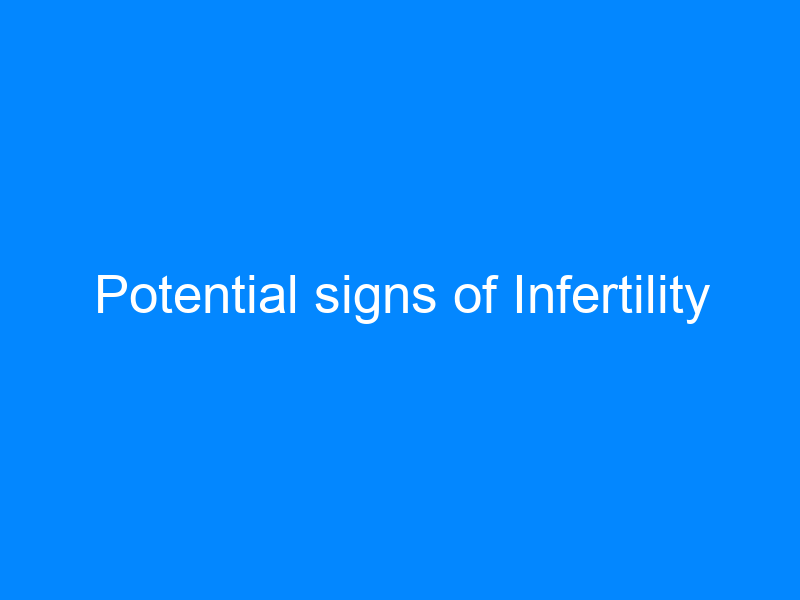Potential Signs of Infertility
Table of Contents
Unsuccessful conceiving even after trying for a year (or for 6 months if you are of 35 years of age or above that) with unprotected sexual intercourse is known as infertility. While some couple shows potential signs of infertility some couple does not have any signs or symptoms of their infertility. It is important to talk to the doctor if you are in such a situation.
Before coming to a conclusion of you or your partner having infertility issues, it is good to try to get pregnant for at least a year. In this article, we list a few things that you and your partner can consider if you think you are going through infertility. If you find any of the following potential signs of infertility, it is better to approach your doctor.
Some warning signs of infertility that can make your pregnancy difficult can include the following.
Title: Irregular Menstrual Periods
It is common to have irregular periods at the starting of puberty but once you enter teenage, they should get regularized. Irregularity of the menstrual cycle may indicate infertility as it may lead to ovulation problems. The best time to talk to the doctor is when you have unusually short or long periods (< 24 days or > 35 days) or if you have a quite unpredictable period or you don’t get it at all.
Polycystic ovarian syndrome PCOS could be one of the most common causes of irregular periods resulting in ovulation-related infertility. There are other causes of irregular periods like doing excessive exercises, low ovarian reserve, primary ovarian insufficiency, improper thyroid functioning, or being obese or underweighted.
Title: Menstrual Cycle with Heavy or Light Flow and Cramping
While bleeding for 3 to 7 seven days during periods is normal, you should inform the doctor if you experience very light or extremely heavy flow. You may also have some other period-related signs that indicate fertility issues like severe menstrual cramps, changes in the pattern of bleeding, changes in the length of bleeding, and abnormal spotting between cycles.
When you experience severe menstrual cramps that are enough to disturb your daily routine, then it may indicate either endometriosis or pelvic inflammatory disease PID. PID and endometriosis are the common conditions causing infertility and can get worsen with time if left untreated.
Title: Age Particularly More than 35 Years
The fertility rate declines with advancing age, be it a man or a woman. The infertility rate starts to reduce from 35 years in women and continues to decline. While the chance of achieving pregnancy in a 30 years woman is 20%, it is only 5% in a woman aged 40 years. The baby may have an increased risk of having a congenital disease or you may suffer a miscarriage if you are above 35 years.
With increasing age, there is a fall in male fertility rate and sperm health as well including that of sperm DNA damage. Fathering a child in your advanced age can increase the risk of miscarriages, transferring genetic problems to a child, and some other congenital diseases. Baby can also have an increased risk of getting autism and schizophrenia with increased age of the father.
It has been found that many people do not know that the female fertility rate declines with age. They sometimes misinterpret that they can even get pregnant at age 40 or 44. They may also assume that their fertility problems would be solved only through IVF treatment, where it is not like that.
Increasing male partners’ age also impacts IVF treatment outcomes. 11% increased risk of not getting pregnant and 12% increased risk of not having a live baby birth is seen in increasing paternal age.
Title: Over or Under Body Weight
You may face troubled pregnancy with increased body weight. Obesity is said to a preventable cause of subfertility. Some studies found that overweight women can regain ovulation when they strive to lose 5% to 10% of body weight.
Male fertility is also impacted by over or underweight. A meta-analysis says that men having lower BMI than 20 might suffer from low sperm count and low sperm concentration. Men who are obese are said to suffer from low sperm count as well as low testosterone levels.
Title: Rate of Getting Miscarriage
You may require expert help to get pregnant if you experience repeated episodes of miscarriages. It is common and is seen in 20% of pregnancies. It is also found that only 1% of women will experience three pregnancies in a row. Recurrent or repeated miscarriages should not happen in a row and you should see your doctor if you have 2 repeated or successive miscarriages.
Title: Chronic Illness
Chronic diseases like diabetes, hypothyroidism, untreated celiac disease, and periodontal disease and the treatments done for them can double your risk of infertility. Treatment of chronic issues with antidepressants, insulin, and thyroid hormones may cause irregular periods and thus negatively impact your fertility. Male factor infertility may be caused when you take medicines like Tagamet (cimetidine) and some hypertension medicines. These medicines will result in problems with the production of sperms or reduce sperms’ ability to swim and fertilize the egg.
Title: Treatments for Cancers
Fertility problems may also result from chemotherapy and radiation therapy taken for cancer treatments. If you or your partner had a history of cancer treatment or presently taking treatment for cancer, you should know from your doctor about the effects the treatment has on your fertility.
Title: Sexually Transmitted Disease (STIs)
With infection and inflammation to reproductive organs caused as a result of STIs, your fertility gets reduced. In STIs, organisms like chlamydia or gonorrhea cause infection and blockages of fallopian tubes which makes pregnancy impossible and even puts you at an increased risk of ectopic pregnancy.
Chlamydia or gonorrhea most of the time does not show symptoms in a woman and this is the reason you need to undergo screening tests for STIs if you have doubt of getting infected.
If you are a man with an untreated sexually transmitted disease, you have increased chances of infertility. Scar tissue that is formed due to STIs in the reproductive organs can make it difficult for semen to transfer and even blocks the passage of semen.
Title: Addiction to Smoking and Alcohol
Smoking and alcohol consumption is bad for general health as well as for fertility. Smoking when trying to get pregnant can have negative effect on sperm count, shape, and movement. These are the most important features of sperm that are needed for conception. There have been poor IVF treatment outcomes in couples where the male person is a smoker. Erectile dysfunction can result from smoking.
If you are a woman, smoking can cause faster aging of ovaries, poor ovarian reserves, and triggers to cause early Menopause. The early you quit the more chances of reversing your damage.
Taking too much of alcohol can result in fertility issues in both the partners. While minimum drinks per week are not problematic, heavy drinking is said to cause low sperm count, poor sperm motility, and abnormal shape and size of sperms.
The damage caused by smoking to your male reproductive organs can be reversed once you quit smoking. Quitting smoking and alcohol can bring about overall good health conditions along with improved fertility rates in both men and women.
Title: Exposure to Toxic Chemicals
The risk of infertility and decreased sperm health is more if you spend more of your time in close contact with toxic chemicals. Farmers, varnishes, painters, men working with metals, and welding are the jobs that have men making use of higher toxic chemicals and they show reduced fertility. Talk to your doctor about suggesting any protective measures if your job involves either exposure to chemicals or to high heat.
Title: Prolonged Exposure to High Temperatures
The high temperature of reproductive organs like the scrotal sacs is considered bad for sperms. Keeping your testicular area cooler and comfortable may promote good airflow and healthier sperm.
Tight briefs or skin sticking underwear made out of non-breathable fabric is extremely bad for the health of sperms. Other than tight briefs sperm health can be troublesome due to overheated car seats, hot tubs and prolonged hot baths, prolonged use of a laptop in lap, and prolonged sitting with legs keeping together.
The damage to sperm health due to heat is reversible. Lessening heat exposure can have improved sperm motility.
Conclusion
80% of the couple gets pregnant within 6 months of trying and 90% of the couple can achieve pregnancy even after a year if they effectively follow timed sexual intercourse.
If you fail to conceive even after trying for one year you should talk to your doctor. If you are of 35 years or above and if you fail to achieve pregnancy after trying for 6 months you should consult your doctor.
If you have a possible sign of infertility, your doctor can treat you by giving some basic fertility tests. Once everything is normal you can continue to achieve pregnancy naturally. You can increase the chances of pregnancy by tracking your fertility issues sooner and by undergoing the best fertility treatments that suit you.



